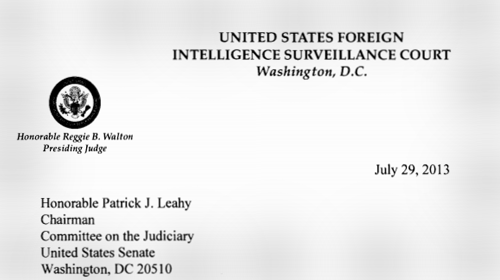
About two weeks ago, Sens. Patrick Leahy and Chuck Grassley, the chairman and ranking member of the Senate Judiciary Committee, wrote a letter to the secret Foreign Intelligence Surveillance Court asking questions about the court's operations in advance of their committee's hearing tomorrow on the National Security Agency's surveillance programs.
Yesterday, the FISA Court's Presiding Judge Reggie B. Walton answered the senators. Judge Walton's response confirms what we already knew: the government's surveillance programs are in need of serious reform.
One of the premises of the legal framework that regulates foreign-intelligence surveillance is that individual privacy will be protected through challenges brought in secret by telecommunications companies, Internet service providers, and other entities that hold sensitive records about Americans' communications. The FISA Court's letter to the Senate Judiciary Committee discloses the remarkable fact that the last such challenge was filed six years ago.
It seems that no service provider has challenged a directive issued under the FISA Amendments Act, and no service provider has challenged an order issued under Section 215 of the Patriot Act. Nor has any provider challenged any gag order imposed in connection with these surveillance activities.
For more information on NSA Surveillance, go here.
Judge Walton's reply supplies conclusive evidence that the legal framework that regulates government surveillance is fundamentally broken. The mechanisms that were meant to serve as checks against abuse remain entirely hypothetical, but the dragnet surveillance programs that have been exposed over the last few weeks are a very real and direct result of this systemic failure.
Tomorrow I will testify before Chairman Leahy and Ranking Member Grassley's Senate Judiciary Committee on NSA surveillance alongside former FISA Court Judge James G. Carr. As the judge's recent New York Times op-ed argues, the FISA Court must once again become what it was originally intended to be: a check on the executive in defense of individual liberty and privacy.
You can watch the hearing tomorrow live at 9 a.m., here.
Learn more about government overreach and other civil liberty issues: Sign up for breaking news alerts, follow us on Twitter, and like us on Facebook.

